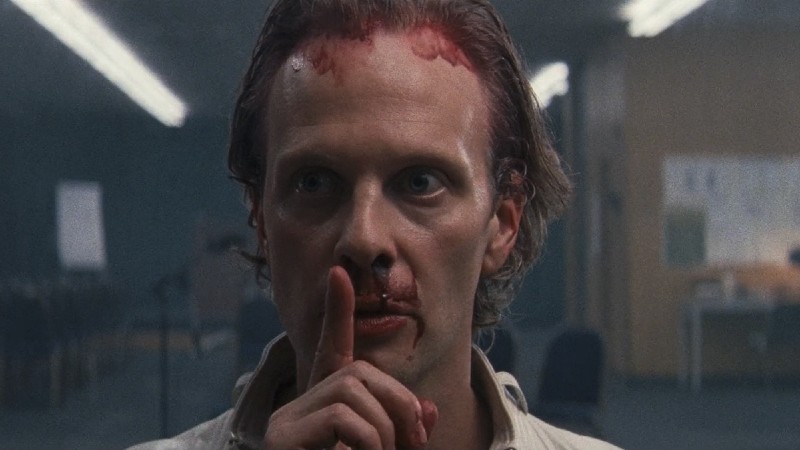




The drama of Tilman Singer’s Luz centres on a young cab driver, the titular character of the plot played by Luana Velis, who enters a police station and is followed in by a dark entity. The word drama is most apt to describe the film because it’s far removed from cinema as a narrative form. Coupled with an unbridled concern over bastardising religious prayer, Luz possesses a bolshie attitude that will lead to a divisive response – angering some, frustrating others, while also delighting.
As the American-Polish novelist Jerzy Kosiński said, “The principles of true art is not to portray, but to evoke”, and Luz is a work that in part honours this sentiment. Drawing attention to cinema as not an exclusively narrative form is not new – Jean-Luc Godard and David Lynch to varying degrees explored film as narrative versus film as art. This has been a recurring exploration that contributes to the discourse of a film versus a movie, and the characteristics of art versus commercial cinema. Singer now adds his voice to this discourse, and by focusing on aesthetic over the portrayal of a tightly woven narrative, he evokes the struggle of film to recreate a dream.
This may have not been Singer’s intention, but the film is seemingly in a nightmare – the characters not grounded within a physical space, but a hallucinogenic one. The space can morph from one into another, from a shared space in which characters all exist into the imagination or mind of Luz. The hyper and surreal images the mind conjures up in the semi-conscious state, their fluidity, albeit abstract and without logic is seemingly in moments what a film such as Luz is bordering on replicating. The difficulty in creating this is the same challenge Lynch has mastered, crafting films that shed narrative to become confusing puzzles through dream and nightmare. Luz however is less successful in its surreal and dreamlike moments. It lacks the strange spontaneity that makes dreams and nightmares unique, and missing a more coherent or structured narrative through-line, a strength of the film early on, is regrettable.

Singer and his cinematographer Paul Faltz, co-editor Fabian Podeszwa, foley mixer and sound designer Steffen Pfauth, and composer Simon Waskow orchestrate a strong opening that uses spatial distance and sound effectively. The film opens with an interminable wide shot inside the police station. By distancing us from the scene as Luz enters the building, we’re forced to look closer as we watch her buy a drink from the vending machine, before she asks the on-duty receptionist existential questions that sound more impactful. The distance is warped in other nuanced ways, the sound levels raised to create a disorienting sound scape, that contributes to a later question of whose mind we are in, of what’s real versus imagined? Meanwhile Waskow’s score cleverly contributes apprehension or expectation, rather than tension or suspense.
The cut to a pulsing title is then followed by close-ups of a man’s hands as he reaches a pager from his pocket. Then cut to a wide shot of him sat at the bar, followed by a close-up of the eyes of an unknown woman. Then cut to a wide shot of the man she’s looking at, back to the eyes and a pan down to her red lips, and a question asked without her lips moving, before cutting back to the him sat at the bar. In contrast to Luz’s entrance, Singer and Podeszwa juxtapose distance with an intimate closeness, displaying a playfulness with the camera and the edit. It effectively sets the stage for a film that is unstable in terms of the spatial, and what’s real versus dream or imagination.
Luz is a not a film without flaws, yet a raw energy courses through it that draws to mind a couple of comparisons. Firstly, to the production limitations that influenced the tight framed shots of Mark Jenkin’s Bait (2019), contributing a distinct aesthetic that makes the film only more beguiling. Similarly, the mime and performance theatre used by Singer grant it a playfulness that makes it all the more beguiling, effectively masking the budget restrictions that forced an economy of shooting locations. Then there is David Lynch’s Lost Highway (1997), and the structured suspense of the first part of the film with Bill Pullman versus the descent into chaotic dream or nightmare with Balthazar Getty. Singer mirrors this to a point, and just as with Lynch’s film, there is a friction between the two parts that requires the audience to transition their mindset. while an appreciation may lead to frustration, and while flawed and imperfect, it’ll be one of the singularly creative films of this calendar year.
Luz is out on VoD on June 1st.











